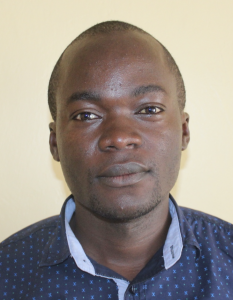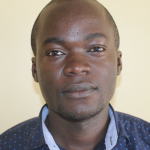Muhaya Primary School has 467 students and 16 teachers who need access to sufficient, safe water to meet their daily needs.
Currently, they rely on a partially protected dug well without a hand pump on their school campus. But the well has several issues; it is seasonal, difficult for students to use, and doesn't provide enough water to meet the entire school's needs. Not to mention the water is questionable to consume, and students dropping their dirty collection containers in and out of the well only adds to making drinking the water risky.

"Life has not been good for us. Lack of enough clean water has really affected our school program in terms of syllabus coverage and also attending classes some of our pupils miss lessons. As a teacher concentrating on teaching a few pupils becomes a challenge," said teacher Mary Waisaya, shown below carrying water with students.

"In the morning, pupils are not able to attend lessons as the majority spend [their] time collecting water for manual cleaning. This contributes to slow syllabus coverage, and minimal concentration of pupils in class, hence poor performance," shared our field officer Victor Musemi.
"Water is life to me. My things have really affected my learning program, such as poor hygiene standards in school due to lack of enough water for manual cleaning and drinking, health issues caused by drinking uncleaned water, and also much time spent looking for water," said Precious, shown below collecting water at the well.

The school administration is very excited about us installing a new borehole so the water problems of the school can be alleviated and students can use their time and energy for learning.
What We Can Do:
New Well
We conducted a hydrogeological survey at this school and the results indicated the water table beneath it is an ideal candidate for a borehole well. Due to a borehole well's unique ability to tap into a safe, year-round water column, it will be poised to serve all of the water needs for this school's large population, even through the dry months.
The school will help collect the needed construction materials such as sand, rocks, and water for mixing cement. They will also provide housing and meals for the work team, in addition to providing local laborers. We will complement their materials by providing an expert team of artisans and drilling professionals, tools, hardware, and the hand-pump. Once finished, water from the well will then be used by the school's students and staff for drinking, handwashing, cooking, cleaning, and much more.
Handwashing Stations
The student health club will oversee the two new handwashing stations we will provide, and make sure they are kept clean and in working condition. The club leaders will fill the handwashing stations with water daily and make sure they are always supplied with a cleaning agent such as soap or ash.
VIP Latrines
We will construct two triple-door latrine blocks using local materials that the school will help gather. Three doors will serve the girls and three doors will serve the boys. All of these new latrines will have cement floors that are designed to be easy to use and to clean. And with a borehole right on school property, there should be enough water to keep them clean.
Training on Health, Hygiene, COVID-19, and More
We will hold a one-day intensive training session with students, teachers, and parents. This training will cover a wide range of topics including COVID-19 symptoms, transmission routes, and prevention; personal and environmental hygiene; and the operation and maintenance of the borehole, latrines, and handwashing stations. There will be a special emphasis on handwashing.
Our team of facilitators will use a variety of methods to train, including participatory hygiene and sanitation transformation, and asset-based community development. We will initiate a student health club, which will prepare students to lead other pupils into healthy habits at school and at home. We will also lead lectures, group discussions, and provide illustrative handouts to teach health topics and ways to promote good hygiene practices within the school including handwashing and water treatment. We will then conduct a series of follow-up trainings before transitioning to our regularly scheduled support visits throughout the year.
We and the school strongly believe that all of these components will work together to improve standards at this school, which will help lead to better student academic performance and will help unlock the opportunity for these students to live better, healthier lives.





 Borehole Well and Hand Pump
Borehole Well and Hand Pump
 Rehabilitation Project
Rehabilitation Project


































